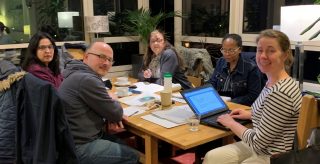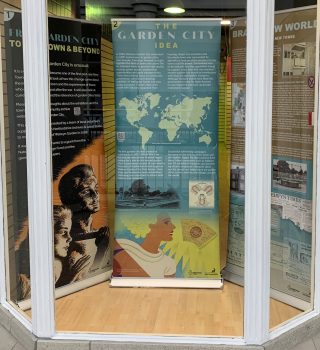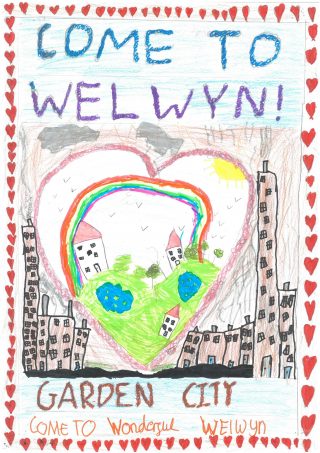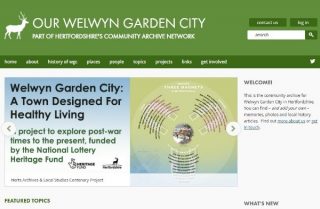Project Background and Aims
In 2020, Welwyn Garden City celebrated its centenary. Since Hertfordshire Archives & Local Studies holds rich and diverse collections relating to the history and development of the town and is committed through the Heritage Strategy to embedding heritage in the life of the local community, in 2019 we submitted a project bid to National Lottery Heritage Fund to support our contribution to the celebrations. We were delighted to receive nearly £10,000 in funding for a year-long project to map and share a more inclusive story of the town. Much is known about the pioneering early decades, but we wanted to shine a positive light on the lower profile post-war developments and residents’ experiences.
Key Achievements
We achieved our aims through a touring exhibition; a new primary school workshop, developed in partnership with Welwyn Hatfield Museum Service; an events and outreach programme; the development of new content and recruitment of new volunteer editors for the Our Welwyn Garden City community archive website; the cataloguing and re-packaging of archive materials from a variety of societies in the town.

Exhibition Community Volunteers Meeting in Person Feb 2020- pre COVID
We recruited seven volunteers to work on the community history exhibition and provided training in research methods and techniques for creating exhibitions. Project staff worked with the volunteer team and designer to co-create an exhibition which focussed on postwar changes and the experiences of minority communities and young people, which the team gathered through interviews. This is currently on display in the Howard Centre and will tour other locations in 2021/2 as COVID restrictions allow. We embedded QR codes in the hard copy panels to enable visitors to access further supporting materials and to leave comments and memories of their own. We also created an online version of the exhibition to maximize access and engagement.

Exhibition Panels on Display in the Howard Centre, Welwyn Garden City
” I am looking to change career to an archive or library-based position. Working on this project has helped me gain valuable experience to help me achieve this goal. In turn it helped contribute to a project about a town that I have a strong connection with. I have subsequently become involved with the Our Welwyn Garden City website as an editor and will hopefully become involved at HALS when the current restrictions have lifted. “
(Darren, exhibition volunteer)

Poster promoting WGC by Year 4 pupil
The schools programme explored the key features of garden cities, the issues they were intended to address, archive material relating to the core themes of work, home and leisure. Older key stage two children were also invited to reflect on the relevance of garden cities to contemporary issues such as housing and the environment. The session was accessed by 460 primary school children. The session was piloted at Hertfordshire Archives & Local Studies and adapted first for remote delivery online and was later pre-recorded to maximize access during the pandemic.
” I think it has helped me see the value of studying Welwyn Garden City. I can also see how valuable the available resources would be to do this. I will follow it up now and study it again in the future. It was pitched very well towards the age of the children and fully engaged their interest. “
(Year 5 teacher accessing the remote session via MS Teams)

Online MS Teams showing of the Archive Films
We reached over 200 people through our events and outreach programme which included screenings, talks and reminiscence workshops. The first event, a talk and document viewing, was held at Hertfordshire Archives & Local Studies, the remainder being delivered online or in the case of the walking tour pre-recorded as a film and shared on Our Welwyn Garden City.
” The films were lovely, but I did find them almost unbearably moving at times, particularly the first one, dated 1928. My mother died last month, at the age of 100, and I kept looking at the faces of those laughing little girls thinking, ‘that could have been her.’ “
(Attendee at archive screening)

OurWelwynGardenCity.org.uk Home Page
We recruited and trained three new volunteer editors for Our Welwyn Garden City who will be staying on after the project. We used the site to showcase the project, promote the school sessions and events and to capture and share memories and views submitted during the project. We added nearly 30 new pages and during the project, the website attracted 18,559 visits and 48,533 page views. 62% of those accessing the site were aged 18-34, 16% 35-44 and the remaining 22% aged 45 and over. The overwhelming majority came from the UK (86%), with others in the top ten visiting from the US, Australia, Canada, China, Ireland, India, Germany, France and the Netherlands. For comparison, this represents an increase of 3% in users and new users on the previous period. The number pages had also increased by 8% and the number of pages per session by 8%. The length of time that people were spending online had increased by 18%.
In terms of work on collections, records of the town’s Horticultural Society, the Craft Workers’ Guild and architect Malcolm Sefton have been added to the catalogue. A smaller, discrete, collection that was completed and made live online is the records of Welwyn Garden City and District Trades Council (1945 – 1968). Also, the records of Welwyn Heritage Trust (c1948 – 1979) were catalogued as DE/X1058 but only with a draft collection level description. The papers of Dorothy Hess, musician and piano teacher, were catalogued but remain in draft. Work was interrupted by the pandemic but is due to be completed in 2021. The work to re-package collections was carried out by two new members of staff as part of their induction as volunteering had been suspended. In total we repackaged 953 items and made 321 new catalogue entries.
Additional benefits
The pandemic changed the way we delivered our project, but did not alter our key aims or outcomes. It accelerated our acquisition of technical skills around video-conferencing, online events, filming and editing. With the underspend from some areas of the project that could not be delivered, we were able re-allocate funds for other work such as reminiscence training for staff and volunteers. This was accessed by 10 staff and 3 volunteers. It enabled us to devise and send out self-led reminiscence packs to all the care homes in Welwyn Garden City. A further positive outcome of the pandemic was the even more minimal environmental impact of the project.
Lessons Learned
We learned that that we are flexible and resilient. Those directly involved in the project acquired greater experience in problem solving, project adaptation and management, delivery of online events and formal education, all of which were and are extremely valuable. We learned the importance of reliable IT equipment and wifi. We also learned to be at peace with the fact that something might go wrong, but that it wouldn’t be insurmountable and that practice goes a long way to reducing concerns about presenting online. If we were planning a project now, we would build the flexibility for offline/online delivery as a default. Project staff learned a great deal about finance systems, procurement and budget management which will be useful to them in future projects. Overall, we learned to stay flexible, positive and calm. In this way, we delivered all the elements of our project over which we had control. Our warmest thanks go to our project partner, volunteers, and wider supporters, as well the National Lottery Heritage Fund and its players.
Wider Outcomes
In summary, the project enabled Hertfordshire Archives & Local Studies to provide opportunities for a wider range of people to engage with archives and local heritage and for those people to develop new understanding around the history of the town, in particular the postwar years. The project also enabled us to attract a number of volunteers, the majority of whom will be staying on to support the service. Through the project, these volunteers were able to learn and practice a range of new skills. The learning from the project will make HALS more resilient and help us to develop future projects, education and community history programmes.






Add your comment about this page